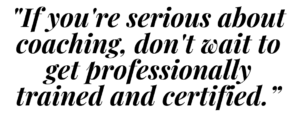To begin, I want to cover a fundamental requirement for success in any endeavor: get yourself properly trained. Coaching is a unique professional vocation. The government doesn’t require that you get any coaching education or be licensed as a coach. Anyone in America can call themselves a coach and many people do. 
I’m very much in support of making it easy to go into business. However, speaking as a veteran coach, I believe you need to be trained to coach, which entails serious effort and concentration.
Return with me to October of 2008, when I entered the world of coaching. I purchased a coaching franchise and went to the headquarters for a week of training. The objective was to learn how to coach and run a coaching practice.
The training was valuable. I absolutely had to have it, but about half of it was dedicated to launching a coaching business. We talked a lot about sales and marketing techniques. There wasn’t a whole lot of information focused on actual coaching techniques, such as active inquiry, behavioral coaching, appreciative inquiry, and perceptual coaching. I left wondering how much I really learned about the art of coaching.
Nonetheless, in 2009, I started coaching and found that I had some natural instincts to do it well, based on my background as a mentor, manager, and occasional trainer. I had owned businesses and been immersed in the world of professional development by listening to tapes, CDs, reading books, etc. I was passionate about the topic of professional development. I felt like I was made for this profession and that came across in my coaching as I helped clients develop their businesses and careers.
 As the years went by and my coaching practice continued to grow, there was a small voice in the back of my head that grew louder and more insistent, saying I should get professionally trained as an executive coach and I should earn a credential from a body like the International Coaching Federation or ICF. In 2014, I listened to that voice and I went to the Center for Executive Coaching in Sarasota, Florida. Andrew Neitlich, a very experienced executive coach and trainer of coaches, founded and runs the CEC. He’s been certifying coaches for nearly two decades now. It was the most money I’d ever spent on a training program, but it was great and completely worthwhile.
As the years went by and my coaching practice continued to grow, there was a small voice in the back of my head that grew louder and more insistent, saying I should get professionally trained as an executive coach and I should earn a credential from a body like the International Coaching Federation or ICF. In 2014, I listened to that voice and I went to the Center for Executive Coaching in Sarasota, Florida. Andrew Neitlich, a very experienced executive coach and trainer of coaches, founded and runs the CEC. He’s been certifying coaches for nearly two decades now. It was the most money I’d ever spent on a training program, but it was great and completely worthwhile.
For three and a half days, I was immersed in the world of professional coaching and loved every minute of it. I felt no buyer’s remorse. It was the right decision. Maybe a little too late, but it was the right decision.
One year later, I went back to Sarasota and took the Master Certified Coach Training program. I wanted to learn what it takes to train other coaches. At that time, I was thinking of future possibilities. In 2016, I earned my professional certified coach credential from the ICF. That was a turning point in my life as a coach. It was eight years after I first hung out my shingle as a coach, and yet I felt like I was really just beginning my coaching career.
Here’s the message I have for you: If you’re serious about coaching, don’t wait to get professionally trained and certified like I did. I waited too long. Looking back, I wish I’d done it sooner. It would have given me more confidence as a coach and I would have succeeded faster in my practice.
2009 was a tough year to begin coaching, and training would have helped me tremendously. Many have said that the best investment you can make is the one you make in yourself. I truly believe that and I’m proud to say that I’ve since joined the faculty of the Center for Executive Coaching.
Now I train and certify coaches in the San Francisco Bay Area in cooperation with Andrew Neitlich. It’s really gratifying to have come full circle on this topic. Now, of course, I’d love to be the source of your coach training, but that’s a decision you have to make. There are countless good providers of effective coach training around the country and around the world. In fact we also have faculty members training and certifying coaches in Europe and Asia.

What’s most important is that you get some training and then get some more. Don’t stop endeavoring to be the absolute best coach you can be. You’ll be running a growing practice and your clients will get the results they’re seeking. You’ll create an upward spiral of positive growth for your business and clients will return to you and refer their colleagues.
If you’d like to watch a video on becoming an executive coach, click here, and make sure to read part 2 and part 3!
If you’d like to talk with me 1on1 about your aspirations to be an executive and leadership coach, schedule time with me here or fill out the contact form.
Here are more articles and videos related to this article:
Articles
- Coaching Professionals Share 10 of Their Best Coaching Ideas
- Roles Coaches Play, Part One, Part Two, and Part Three
YouTube Videos
- Becoming an Executive Coach – Part 1, Part 2, and Part 3
- Studying for ICF Credentials to Become an Executive Coach | Executive Coaching Credentials
- Intro to Becoming an Executive Coach – Training Series by Michael Neuendorff
Photo copyright: Featured photo is from ©michaeljung via 123RF. Second photo is from ©The Coach Space via Pexels.







